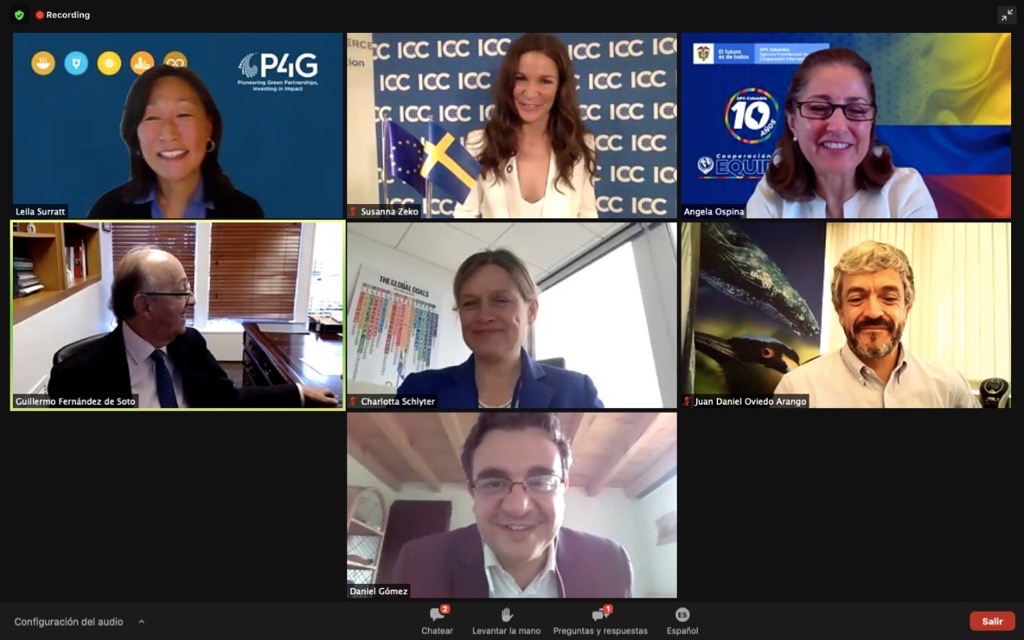Colombia Shares Multistakeholder Approach for an Inclusive and Resilient Recovery

Subject
Events
Country
Publication Date
2021-07-12
Partnership
Building Efficiency Accelerator, Clean Fleets, Clean Cities,
About
Leaving no one behind was the primary theme driving Colombia’s recovery approach from COVID-19. On July 9, at a side event to the United Nations High Level Political Forum, representatives from Colombia and Sweden shared the need for a multistakeholder approach to devising effective recovery policies and cited specific examples and lessons learned from their work. Leila Yim Surratt, Director of Strategy and Engagement, P4G moderated the discussion. The event was organized by the government of Colombia in partnership with Sweden.
"Unity and collaboration are preconditions for a sustainable and resilient recovery that doesn’t leave anyone behind." Guillermo Roque Fernández de Soto, Ambassador and Permanent Representative, Mission of Colombia to the United Nations, kicked off the session reminding the audience of the importance of inclusivity and our global interdependency. He shared a few of the main objectives of Colombia’s third Voluntary National Review (VNR), where countries present the status of their Sustainable Development Goal (SDG) implementation to learn from each other and accelerate progress. Objectives included integrating the SDGs into the national development plan; strengthening the participation of non-governmental stakeholders; and sharing national progress at the subnational levels. He emphasized that the SDGs should be the “North Star” of multilateral work for every country.
Charlotta Schlyter, Ambassador for Sustainable Development, Mission of Sweden to the United Nations, emphasized the collaboration between Sweden and Colombia and called out peer learning exercises between the two, the findings of which Sweden incorporated into its own VNR. She mentioned the need for transparency and trust between multistakeholder partnerships and the importance of engaging local partners from the communities. As Schlyter aptly said, local actors not only need to be invited to take a seat at the table, but also “need to be part of the foundational set up of the table itself.”
Highlighting the focus on inclusive development, Juan Daniel Oviedo, Director, National Statistic Department of Colombia, spoke about the department’s work sharing disaggregated data so different government departments and stakeholders could make effective subnational decisions based on their unique situations. He gave a specific example of using data combined with a multistakeholder approach to develop relevant policies for Colombia’s indigenous population and those of African descent.
Daniel Gómez, Director, National Planning Department of Colombia, outlined key priorities of the country’s recovery policy which included preventing poverty, strengthening businesses and improving inter-governmental coordination and responsiveness. He cited an example of Colombia pooling government and private sector resources to design a program that identified households that could fall into poverty due to COVID-19 and provided them with rapid income support. He shared the importance of building policies with participation from different stakeholders and the ongoing conversations the government is fostering with citizens and the private sector along key issues affecting employment, youth and women.
With the private sector being such a pivotal player in an inclusive recovery, Yim Surrat turned to Susanna Zeko, CEO, International Chamber of Commerce in Sweden, for insight into Sweden’s experience engaging the private sector to accelerate progress on the SDGs. Zeko emphasized the crucial role of businesses in aiding an inclusive recovery from COVID-19 and meeting the climate goals. She highlighted the huge untapped potential of small and medium enterprises in developing countries and the barriers they face in accessing capital. She spoke of several initiatives Sweden was implementing to bridge the climate financing gap such as issuing guarantees to several banks in Africa to de-risk investments and enable loans to female entrepreneurs. Sweden also brought together pension funds, asset managers and investment companies to mobilize resources for developing countries.
Zeko issued a challenge to the audience urging them to ensure that their country delegations to the high-level political forum had private sector representation next year if they were not included this year.
Yim Surratt concurred with Zeko’s points on the role of the private sector in driving change and shared how private sector cooperation between civil societies and government is central to P4G’s impact model.
Angela Ospina, General Director, Presidential Agency for International Cooperation of Colombia, closed the session by homing in on the key concept that is central to all partnerships – trust. She spoke about the importance of bringing national agendas to the people so stakeholders can join forces to deliver impact.
Ospina also launched the South-South Cooperation Knowledge Hub remarking how she was heartened to see powerful countries acknowledge the valuable learnings they could apply from the global south. The Knowledge Hub will be a collaborative space to strengthen and monitor south-south projects that Colombia has with other countries and will showcase best practices from around the world.
Colombia is a country partner of P4G and will host the P4G Summit in 2023. As a leader in green growth, Colombia has integrated the SDGs into its national development plan and has one of the most ambitious Nationally Determined Contributions in Latin America that is closely aligned with its 2050 net zero goal.
P4G has seven partnerships working in Colombia that are aligned to the country’s priorities such as zero emissions transportation, net zero buildings, sustainable agriculture and more. Read more about P4G’s partnerships in Colombia and how they are delivering impact on the ground.
